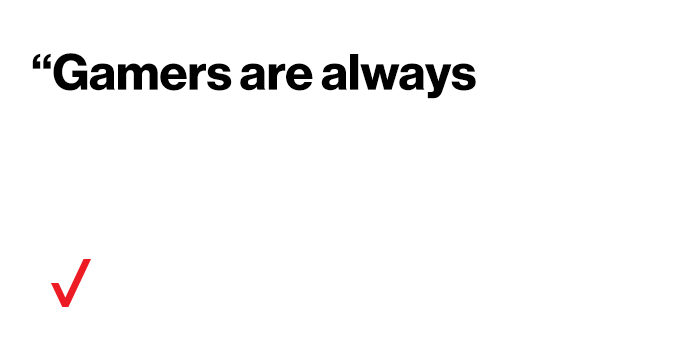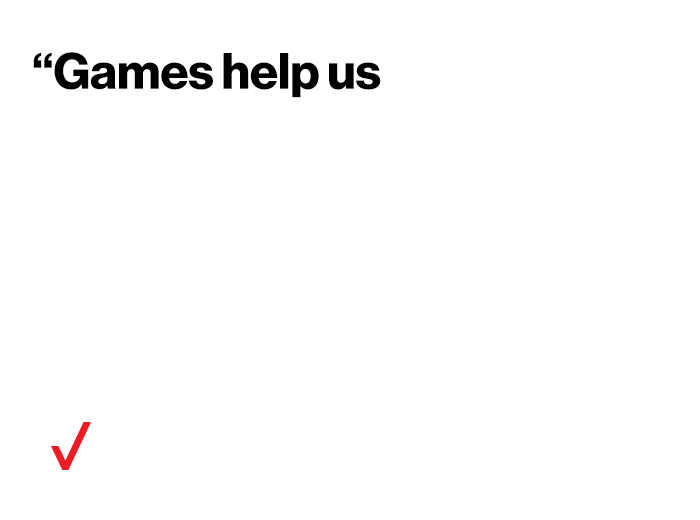Gaming the impossible: Jane McGonigal wants you to save the world
This world-renowned game designer has the tools you need to regain confidence in times of chaos, visualize your future and create positive change.
Full Transparency
Our editorial transparency tool uses blockchain technology to permanently log all changes made to official releases after publication. However, this post is not an official release and therefore not tracked. Visit our learn more for more information.
More of our content is being permanently logged via blockchain technology starting [10.23.2020].
Climate change, a global pandemic, racial injustice … in the face of a society in turmoil, how can we as individuals take better control of our lives and the future?
The answer might be found in video games.
Jane McGonigal, Ph.D. and world-renowned game designer, knows the benefits of video games from personal experience.
After a severe concussion in 2009, Jane couldn’t get out of bed for months. Vertigo, nausea, memory loss, headaches and mental fog plagued her daily, so doctors told her to rest. No running, no phone, no video games, just rest. As with so many others who experience thoughts of suicide as a result of brain trauma, Jane’s mind started to tell her, “You will never get better.” And she feared for her life.
Until one day she decided, “I’m either going to kill myself or turn this into a game.”
Jane knew from her 10 years of research that humans tackle challenges in video games with comparatively more creativity, determination and optimism than we do in real life. Plus, we have an easier time asking others for help. So she made a game out of her healing process, and SuperBetter was born.
SuperBetter, her mobile and desktop app, now has more than 1 million users and is helping people all over the world beat depression, overcome anxiety, heal from physical injury and create new habits, all with the power—and structure—of gaming.
Gamifying self-help
With SuperBetter, Jane McGonigal turns a user’s personal obstacles—like an afternoon smoke break for someone trying to quit, or the long drive to the gym for someone trying to exercise—into “bad guys” to be battled. When we think of any great game, several elements are almost always present: allies, quests, power-ups and epic wins, all of which Jane incorporated into SuperBetter.
These archetypes make a game great because they are central to the human experience. We’re all trying to overcome something, be it anxiety and depression or bad credit. We all seek a community of support. And each of us hopes to find little boosts of energy and encouragement along our quest. Gamification has become pervasive across so many industries. Think of your language learning app, your calorie tracking app, even loyalty programs. They all award badges or points—incentives for your progress and participation.
And in a year like 2020, gamified apps like SuperBetter could be more important than ever. After stay-at-home orders were introduced, weekly downloads of the app doubled, and session time was up 60%.
“Right now,” Jane says, “there’s an incredible amount of chronic stress, anxiety and trauma from folks who are dealing with unemployment, a major illness, a lost loved one. They’re uncertain about the future. SuperBetter seems to be serving an important need right now, especially for folks who need access to mental health support without necessarily going anywhere.”
Since COVID-19 struck, gaming is up across the board. And Jane thinks that’s a good thing: “People are spending more time playing video games, and they’re playing extended family. Grandparents are playing with parents, their grandkids and cousins. It’s a way of keeping our social networks active.” But games aren’t all fun and games.
Games are hard. That’s why they’re good for us.
For Jane McGonigal, video games aren’t the answer because they’re easy or built to please. Quite the opposite. The benefits of video games come from the challenges they present. They force us to focus, put in a sustained effort and overcome our frustrations. We team up with others and use creativity and flexible strategy to affect the outcome.
Where gaming can go wrong, says Jane, is when we use it to escape reality. “That’s why it’s so important to have a reason to play,” she says. “Whether you’re trying to change a mood, manage your negative thoughts or anxiety, or connect with somebody, if you have a clear purpose for why you play, then you can take that back to the rest of your life.” Positive gaming gives us agency.
“Agency is the feeling of confidence that the actions that you take can have a positive impact,” she says. “Real control is not a thing. In a game you’re never totally in control. There are other players, there’s everything the game is throwing at you. But you can take actions and make choices that can lead to a positive outcome.”
SuperBetter, for instance, “shows us that even the tiny actions you take can change how you feel, physically, mentally or emotionally,” Jane says. “That builds confidence over time and has a tangible effect on your life.” It reinforces your sense that “the actions you take matter.”
“In global surveys, year after year, for the past decade,” she says, “people said they feel less control over the future. They can’t think of actions they could take that would create a significant change in their community or in society in the long run.
“Whether it’s economic inequality or climate action or racial injustice, people need to feel the same agency around solving those problems as they do about completing their Pokemon collection or building a replica of their school in Minecraft.”
“You can’t change the world just with self-help.”
From gaming for self to gaming for society
While SuperBetter is aimed at the individual, Jane McGonigal’s teaching has recently focused on society. The course, Futures Thinking, was first taught at Stanford University through the Institute for the Future, where she is the Director of Games Research and Development. But now, through the online education platform, Coursera, anyone can play. And thousands do.
Nearly 17,000 people have enrolled to learn forecasting, simulations, collaborative foresight and urgent optimism. “The course is about using those same ‘gameful’ strengths,” Jane says, “but to help people have hope for society’s future and to believe that they can take actions to change the whole world for the better. We have people from 100 countries taking our classes together and connecting as a global learning group where they are able to imagine a better future with people from all over the world.”
The first thing students learn is how to find signals of change and interpret them.
“When something weird happens that you’ve never seen before,” she says, describing the process, “how do you make sense of it? How do you game out what it might mean for the future? How can you change your own life plan or advocate for your company or organization to adapt?”
Want to amplify Jane’s impact?
Share her story with your community.
Predicting a pandemic, gaming the future
“In 2008, we simulated some potential future crises,” Jane says. “We had about 10,000 people simulate a respiratory pandemic that we set in the fall of 2019. Now I’m following up with players to see how simulating this 11 years ago affected their preparedness for it today. We found that these participants were able to adapt quicker, better manage their emotions and act faster. They had already gone through the anxiety, worked through the uncertainty. They told us things like, ‘Well, I felt scared and overwhelmed when we did the simulation, so when it actually happened, I was able to just settle in and adapt.’”
But it’s not all crises and chaos. Much of Futures Thinking is imagining a future you actually want for yourself and society. For example: “What if instead of going to a college or university for learning, anyone could be a teacher and anyone could grant you a learning credit that you could use to get a job, or to get work that you can be paid for?
“Imagine a massive decentralization of learning the way that Bitcoin decentralized money. There’s no third party. That’s one of the simulations you get to play out in the class.”
Jane McGonigal asks us to think of the future like a game of chess. “There are more variations of possible chess games than there are atoms in the universe. Yet we still manage to play chess successfully, without being overwhelmed by that infinite range of possibility. That’s because when we play chess, we get really good at running all of these simulations simultaneously. You’re playing out these multiple chains of cause and effect.”

So Jane asks her students to run those simulations but with real-world actions: “If we organize this protest, if my company changes their focus, if I move my family to this location, what might happen next?” Playing out these possible outcomes enables us to better evaluate our future. “And gamers,” Jane says, “are always ten steps ahead.”
Think like a gamer
Gamers are constantly looking for signals of change in the environment and signals that the old ways of doing things aren’t as effective. “That ability has a neurological basis in the posterior cingulate cortex of the brain,” says Jane. And in gamers this region is more active and better developed.
Once gamers gather up all these little signals, all these data points, they start to see patterns. They develop the ability to notice change before it happens. And then they have the opportunity to decide what to do in response to that change: amplify it, accelerate it, resist it or work to prevent it.
In our lives, we’re constantly being scored, be it for a credit report, a dating app, a performance review at work or an Uber rating. “In order to thrive in these environments,” Jane says, “you have to understand how the scores are being calculated. So, gamers ask, ‘What can I do to increase my score? What increases it the fastest? What hurts my score?’ And they find out by playing with the system and understanding how it’s designed. Basically, you have to get behind the curtain, and gamers are some of the best at it.”
Gaming the impossible
Jane McGonigal’s work teaches us that one of the greatest benefits of video games is they help us think more hopefully and creatively about how the future might be different. Whether it’s in your own life or in society, they teach us to stretch our imagination and believe that change is possible.
“The impossible has already happened this year,” Jane says. “Every child in America stopped going to school and did all their learning at home. People across the world stopped moving, stopped driving, stopped flying.

“We don’t always get the future we want,” she says. “But the ability to believe that impossible change is possible, and to figure out what you need to do to prepare for it, sets you up to create the future you want.”
In 2019, during week two of the course Simulation Skills, Jane gave participants an assignment: "Imagine the world is currently facing a respiratory pandemic. How would you change your daily behaviors? What would you do to help others?"
“If you had taken the class last fall,” says Jane, “you would have been preparing for COVID-19 six months before anybody was really thinking about it. There’s lots of other games like that, other weird futures. Now that one has actually happened, there are lots of other weird, weird futures to tackle.”
Know someone who's creating a positive impact using technology and connectivity? Send us a message at story.inquiry@verizon.com. They could be next in our story series.